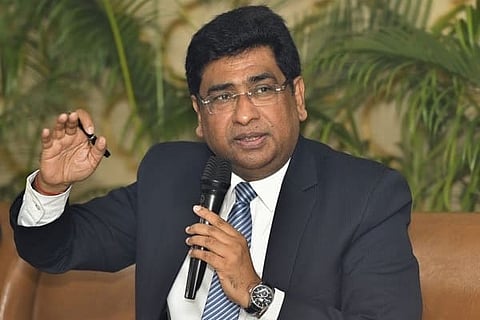
- News Updates
- PSU Watch
- Defence News
- Policy Watch
- हिन्दी न्यूज़
- Jobs Watch
- States News
- Event News

New Delhi: Railway Board Chairman VK Yadav said on Thursday that the 151 trains that the Railways has planned to operate via the PPP (public private partnership) model would start operations from April 2023 onwards. He added that the new trains will address the demand-supply deficit in the passenger transport sector. While stating that there will be roughly 5 percent of the 2,800 mail express trains that will be operated as private trains, Yadav said that the Railways will continue to run the majority of private trains.
These additional trains will be run on the busiest routes, where demand is unmet or the number of waitlisted passengers are high, he said. "Want to provide trains on demand and we are doing work on infrastructure projects towards this," Yadav told the media at a press conference.
The Railways had invited proposals from bidders and allow private players to run 151 modern passenger trains on PPP basis across 109 routes. Financial bids for the same are likely to open by February or March next year, said Yadav. He added that the project will entail an investment of Rs 30,000 crore from the private sector. These trains will operate in 12 clusters, including Bengaluru, Chandigarh, Jaipur, Delhi, Mumbai, Patna, Prayagraj, Secunderabad, Howrah, Chennai.
The trains will be manufactured in India and the private firms will be responsible for the financing, procurement, operation and maintenance of the trains. The concession period for the project is 35 years. And the private operator will have to pay the fixed haulage charges, energy charges as per actual consumption and a share in gross revenue determined through a bidding process. The safety of all these trains will be looked into by the Railways and these trains will be operated by the national transporter's drivers and guards.
Yadav added that the Railways will be able to recover the amount it will spend by levying haulage charges. "This will make us revenue neutral," he said. Besides, there will be key performance indicators such as like punctuality, reliability, upkeep of trains, among others, for the private firms and not adhering to these will attract penalty, he said.
(PSU Watch– India's Business News centre that places the spotlight on PSUs, Bureaucracy, Defence and Public Policy is now on Telegram. Join PSU Watch Channel in your Telegram and stay updated)
